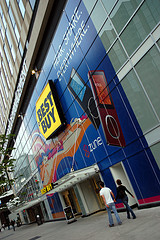Best Buy Founder Finally Set To Make Offer On Buying The Company Back
The Minneapolis Star-Tribune reports that Schulze, who started the company more than 40 years ago and who still owns about 20% of the company, has managed to line up sufficient financial backing from banks and private equity firms to make an offer that will be at least $5 billion, though earlier reports had pegged the number closer to $10 billion.
The company’s stock has dropped precipitously during a year when CEO Brian “Done and” Dunn stepped down under a cloud of scandal, followed by Schulze leaving his position as Chairman of the Board. Before Dunn’s exit, the stock was selling as high as $27/share. As of right now, it’s going for around $14/share. Analysts tell the Star-Tribune it expects shareholders would part with their investment for around $17/share.
Whatever his first offer is, Schulze has reportedly said he expects the board to decline. However, he will be allowed to make a second offer in January.
In August, shortly after Schulze announced his intention to buy the company back, Best Buy’s board named Hubert Joly as the new CEO. While Schulze and Joly have reportedly been cordial in the months since, Schulze has made it clear he has other people in mind to run the company he founded.
While Joly and the current Board have a vision of the company as a smaller and more streamlined operation, which means fewer retail locations and stores that are less-big in general. Schulze, however, has stated that this will only push the company closer to extinction. He believes in investing in and expanding the business while at the same time lowering retail prices. It’s a huge risk that could pay off, but would be incredibly difficult to pull off with a publicly held company beholden to so many shareholders.
If Joly is ousted, he will get a nice little payout of $2.35 million, which is twice his annual salary, plus possible bonuses.
Want more consumer news? Visit our parent organization, Consumer Reports, for the latest on scams, recalls, and other consumer issues.


